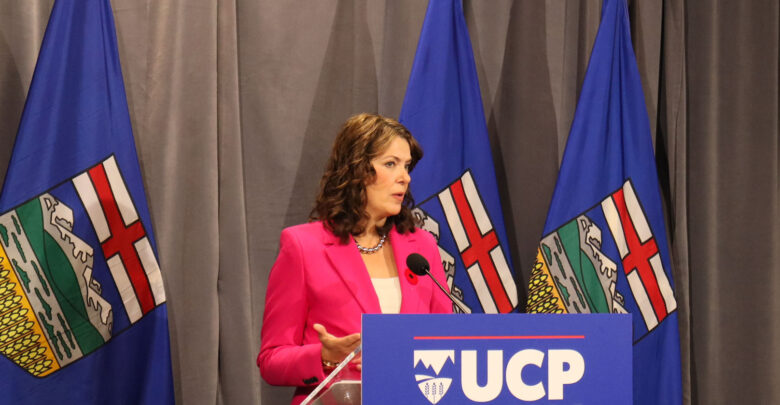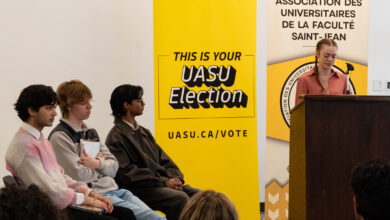Danielle Smith blurs the border between Canadian and U.S. conservatism
The Alberta Premier’s appearance with Ben Shapiro signals a deeper shift toward U.S.-style culture wars — and raises questions about the future of Canadian political identity.
 Leah Hennig
Leah HennigWhen Alberta Premier Danielle Smith flew to Florida to hang out with Ben Shapiro, she didn’t just pack her suitcase. She may have also tried to check Canada’s political identity at the gate.
Smith took the stage in Florida beside United States (U.S.) right-wing firebrand Ben Shapiro. The event, a fundraiser for Florida-based PragerU, took place on March 27. The photo-ops and soundbites from the event may have played well with certain conservative circles, but back in Canada, Smith’s decision to align with one of America’s most polarizing political commentators raises an uncomfortable question: where does Canadian conservatism end and U.S. culture war politics begin?
Smith called the event a “great time,” but for many Albertans, the optics were less than celebratory. Shapiro, co-founder of The Daily Wire, has built his brand on inflammatory takes about race, gender identity, and Indigenous issues. These stances have made him a darling of the American right and a lightning rod for controversy. By cozying up to him, Smith appears unbothered by this divisiveness and willing to import it North.
For decades, Canada’s political culture has drawn strength from its differences with the U.S.. While the two countries share economic and cultural ties, Canada has generally resisted the extremes of U.S. partisanship. Tensions still exist between parties, but our political system and values typically avoid the extreme polarization of the two-party system of our neighbours in the south. However, Smith’s appearance alongside Shapiro — an avatar of America’s combative conservative media machine — threatens to erode those differences.
The premier’s defenders might argue that she’s simply expanding her network or embracing ideological allies. But politics isn’t just about ideas. It’s also about values and tone. And the tone Shapiro brings is one of division, derision, and dog-whistle politics. Alberta’s premier is not a pundit; she is a head of government. Her actions carry weight, especially when they signal the approval of figures who have repeatedly dismissed the legitimacy of marginalized groups and trafficked in conspiracy theories.
It’s telling that Alberta’s New Democratic Party (NDP) and other critics didn’t just condemn the fundraiser — they expressed concern about what it symbolizes. Smith’s public alignment with Shapiro suggests not only ideological overlap but a willingness to adopt the culture war tactics that have fractured American society. That is not what Canadian conservatism has traditionally stood for.
To be clear, no one is saying that Canadian politicians should avoid international alliances altogether. Cross-border co-operation is vital. But choosing to stand beside someone like Shapiro isn’t about international diplomacy. It’s about political branding. And it’s a brand that does not reflect the values of inclusion, decency, and nuanced debate that most Canadians still hold dear. Moreover, if the U.S. continues to hit Canada with tariffs, Canada needs to appear as a united front. It doesn’t bode well for a country’s unity if its officials cannot decide, and carry out, a collective strategy.
This pattern of contentious engagements isn’t isolated. In early April, Prime Minister Mark Carney criticized Smith during an election campaign stop, prompting Smith to suggest Carney has issues with strong conservative women. The exchange was more than political theatre. It underscored Smith’s increasingly combative, American-style approach to political discourse. Smith, it seems, is importing her strategies from Republicans. However, if the recent trade war has taught us anything, it’s that if you import anything from the U.S., expect to pay for it.
As U.S. politics grows more toxic and polarized, Canada has an opportunity and a responsibility to chart a different path. Leaders across the political spectrum should be striving to protect that distinction, not blur it. Smith’s Florida appearance does the opposite. It doesn’t sharpen Canada’s political identity — it risks erasing it in favour of a flashier, more dangerous imitation.
Albertans deserve leadership that looks forward, not south.




